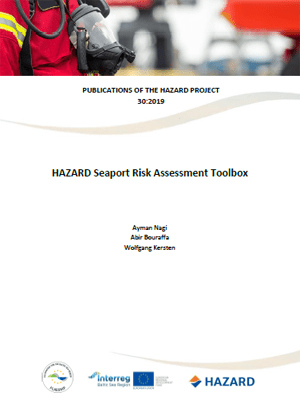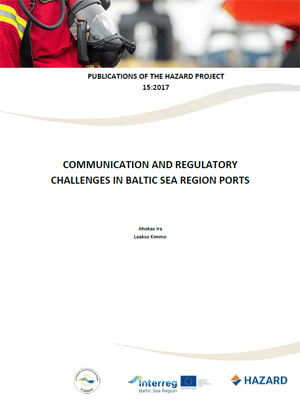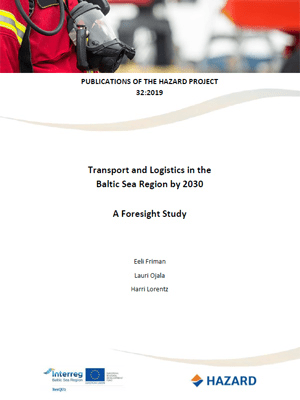HAZARD
Accidents at seaports that endanger people are becoming more likely
Seaports, terminals and facilities to store shipped goods, including those for dangerous goods, are often located close to residential areas. Therefore, a large number of people is put at risk when accidents happen in ports. Vessel traffic in the Baltic Sea region is high and can be expected to increase in the future. Thus, the risk for more accidents also increases, unless the safety and security procedures are improved. Therefore, the EU’s vision is that the Baltic Sea should become a leading region in maritime safety and security. In this context, HAZARD is a flagship of the EU Strategy for the Baltic Sea Region.
Rescue services that exchange beyond borders are better prepared
In case of emergency, different rescue services usually take action, e.g. fire fighters, coast guards and police, but also civil organisations such as the red cross or environmental NGOs might be involved. The set-up and the procedures at sea ports in the countries around the Baltic Sea differ. It is obvious that damages and losses of life can be minimised if the rescue services are well prepared and have set up optimal procedures for cooperating with each other and for communicating with citizens. Joint exercises, evaluations and cooperation across countries can help rescue services from all countries to mitigate the effects of accidents better.
Budgets
in numbers
-
4.18MillionTotal
-
3.25MillionErdf
-
0.00MillionEni + Russia
-
0.00MillionNorway
Achievements
Accidents practiced in near-real life circumstances
In the HAZARD project, sea port authorities together with their rescue services in charge organised ten large scale international exercises in the ports of Klaipeda (Lithuania), Hamburg (Germany) and the Finnish ports of Turku, Naantali and Kuopio. Up to 350 local rescue staff practiced in each port a different emergency situation such as fire on a passenger ship in the port, the leaking of a hazardous substance from a tanker, and an explosion of a chemical tank.
Knowledge compiled for better risk assessment and better communication & regulation
The exercises, which often lasted several days, were observed by international researchers and rescue service peers from partner regions to evaluate the cooperation structures, rescue procedures, and communication abilities and in order to facilitate learning from each other. Taking into account the knowledge gained in joint exercises, rescue services, seaports and academia, among other things, jointly developed a toolbox to assess risks in sea ports, a report on communication and regulatory challenges in safety and security of sea ports and a foresight study about the development of transport and logistics by 2030.
Instant improvements in ports & rescue services
Through this cooperation and sharing of experience several ports instantly introduced new measures. The Port Authority of Naantali (Finland) updated its crisis management procedures. The Fire and Rescue Department of Lithuania developed a standard evaluation procedure for exercises. And Hamburger Hafen und Logistik AG (Germany) improved their IT solution for the emergency response plan. The results of HAZARD are spread further within the project platform RESQU2. By strengthening their collaboration, the Interreg project HAZARD helped rescue authorities to be more effective in the event of an accident in a Baltic Sea port - for the sake of EU citizens’ and companies’ safety and with EUR 3.25 million support from the European Union.
Outputs
Hazard Seaport Risk Assessment Toolbox

Report: Communication and regulatory challenges in the Baltic Sea Region"

Transport and logistics in the Baltic Sea region by 2030: A Foresight Study

Project Stories
-
10.06.2021
Better prepared for emergencies thanks to Interreg
With an average of 300 accidents per year, as reported by the Baltic Marine Environment Protection Commission’s (HELCOM), the Baltic Sea seems to be a challenging area for navigation. The ResQU2 platform has reinforced the preparedness of rescue authorities, services, seaports and other authorities for large-scale incidents in the Baltic Sea.Read full story -
24.10.2019
What municipalities and cities get out of Interreg projects
Interreg is all about the regional development of municipalities and cities. Every tenth project partner in projects funded by Interreg Baltic Sea Region is a local public authority, i.e. an institution involved in governing a municipality or city. But why exactly do they participate in cooperation projects?Read full story -
20.12.2016
Coping with emergencies at seaports
1,000 kg of ammonia was accidentally released into the atmosphere. The incident took place at the warehouse in the Port of Turku and caused a real threat to the workers and people waiting for the ferry at the nearby Tallink Silja passenger terminal.Read full story -
20.12.2016
Fight against contamination: Hazard in Hamburg
An inland waterway vessel collides with a tanker causing an oil leek and release of huge quantities of sulfur dioxide into the atmosphere. Apart from the crews, 75 people working at the nearby refinery get affected and flee the area leaving an open radioactive source behind. Contamination as a possible danger in seaports was picked up by the HAZARD project to exercise procedures, communication, and cooperation among rescue services, local authorities and private companies.Read full story
Partners
University of Turku
- TownTurku
- RegionVarsinais-Suomi
- CountryFinland
- RepresentativeJarmo Malmsten
- Phone
- E-Mail
- Web
Hamburg University of Technology
- TownHamburg
- RegionHamburg
- CountryGermany
- RepresentativeWolfgang Kersten
- Phone
- E-Mail
- Web
Viimsi Municipality Government
- TownHarjumaa
- RegionPõhja-Eesti
- CountryEstonia
- RepresentativeAnna-Helena Purre
- Phone
- E-Mail
- Web
Port of Turku Ltd
- TownTurku
- RegionVarsinais-Suomi
- CountryFinland
- RepresentativeMarkku Alahäme
- Phone
- E-Mail
- Web
Vilnius Gediminas Technical University
- TownVilnius
- RegionVilniaus apskritis
- CountryLithuania
- RepresentativeDarius Bazaras
- Phone
- E-Mail
- Web
SE Klaipeda State Seaport Authority
- TownKlaipeda
- RegionKlaipėdos apskritis
- CountryLithuania
- RepresentativeAleksandras Kaupas
- Phone
- E-Mail
- Web
Southwest Finland Emergency Services
- TownTURKU
- RegionVarsinais-Suomi
- CountryFinland
- RepresentativeTorbjörn Lindström
- Phone
- E-Mail
- Web
Hamburger Hafen und Logistik AG
- TownHamburg
- RegionHamburg
- CountryGermany
- RepresentativeNorbert Smietanka
- Phone
- E-Mail
- Web
University of Borås
- TownBorås
- RegionVästra Götalands län
- CountrySweden
- RepresentativeDaniel Ekwall
- Phone
- E-Mail
- Web
Port of Naantali Ltd.
- TownNaantali
- RegionVarsinais-Suomi
- CountryFinland
- RepresentativeLiisa Majuri
- Phone
- E-Mail
- Web
Neste Corporation, Logistics
- TownEspoo
- RegionHelsinki-Uusimaa
- CountryFinland
- RepresentativeTuumas Mikkola
- Phone
- E-Mail
- Web
Hamburg Ministry of the Interior and Sports
- TownHamburg
- RegionHamburg
- CountryGermany
- RepresentativeJuergen Krempin
- Phone
- E-Mail
- Web
"SUCCEEDED by PP16 (01.01.2019)" Fire and Rescue Board of Klaipeda County
- TownKlaipėda
- RegionKlaipėdos apskritis
- CountryLithuania
- RepresentativeKastytis Gedminas
- Phone
- E-Mail
- Web
Polish Safety and Reliability Association - PSRA
- TownGdynia
- RegionTrójmiejski
- CountryPoland
- RepresentativeKrzysztof Kołowrocki
- Phone
- E-Mail
- Web
Fire and Rescue Department of Lithuania
- TownVilnius
- RegionVilniaus apskritis
- CountryLithuania
- RepresentativeMindaugas Kruopys
- Phone
- E-Mail
- Web
-
Project managerJarmo MalmstenUniversity of Turku
-
Legal representativeJuuso TöyliUniversity of Turku
-
Financial managerSari TähtinenUniversity of Turku
-
Communication managerMariikka WhitemanUniversity of Turku



